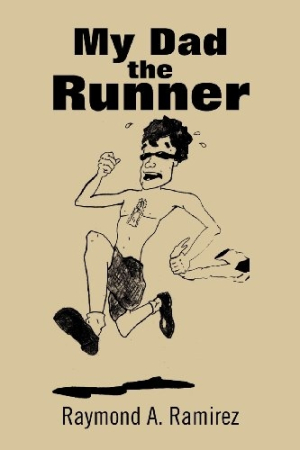My Dad the Runner
The title of Raymond A. Ramirez’s memoir, My Dad the Runner, has nothing to do with track and field, marathons, or anything else relating to sports. Ramirez’s father was a runner of another kind—the kind forever running from the police. Whether over the fence or out the window, the heroin dealer always ran, almost admirable in his ability to escape arrest. When he was finally caught and imprisoned, he left behind a wife and five young sons. “He left us broke with no money at all,” writes the oldest son, Raymond. “We were left in a bad situation,” he adds, without exaggeration.
Ramirez tells a very personal, poignant story of growing up in a garage with no bathroom, an unlikely shelter that becomes his family’s “home” thanks to the efforts of his hardworking mother. Living in a gang-riddled neighborhood in East Los Angeles, he learns to take care of himself and fight for what he believes is important. He is tough, but he is also a “good kid,” protecting his younger brothers, going to school, and helping to cover expenses by working as a shoeshine boy. “I might have grown up poor,” he says, “But where I grew up, a man’s word meant everything.” At age thirteen, he reunites with his father, who is dying and out of prison on a humanitarian release, and the two spend a precious few weeks together. His father’s best advice—to respect women and not take advantage of them—stays with him always.
In the summer of 1965, when the U.S. Marines land in Vietnam, Raymond is only seventeen, but he gets his mother’s permission to enlist. His tales of boot camp are both funny and revealing. “Where did they find these people?” he asks, “because they couldn’t be human.” Even so, he does very well, and, despite his burning desire to go to Vietnam, he ends up as a clerk, “the best job in the corps.” He acknowledges that “Everybody was happy except me.” Thwarted by his good performance, he continues in administrative roles, until finally, in late 1966, he convinces his superiors to send him overseas. Even then, he finds himself in Okinawa, not Vietnam, processing incoming troops.
Ramirez talks of his experiences and his frustrations so convincingly that readers may cheer when, at last, he is sent to Vietnam. His account of being dropped off by a helicopter for his first assignment, only to be confronted by a water buffalo, is positively delightful. Ramirez is so earnest in his writing that readers will be neither surprised nor unsympathetic when he admits “you know that hero stuff I talked about?” Well, that went out the window the first day out in the bush.”
Ramirez’s honesty and sense of humor are so clearly reflected in his words that he achieves something that many writers do not: His audience will care about what happens to him. Despite a casual writing style that sometimes results in sloppy grammar, he tells an endearing story. Fans of Vietnam memoirs will be drawn to it and many readers will find that the book is too short. My Dad the Runner offers the kinds of stories that people want to read.
Reviewed by
Cheryl Hibbard
Disclosure: This article is not an endorsement, but a review. The publisher of this book provided free copies of the book and paid a small fee to have their book reviewed by a professional reviewer. Foreword Reviews and Clarion Reviews make no guarantee that the publisher will receive a positive review. Foreword Magazine, Inc. is disclosing this in accordance with the Federal Trade Commission’s 16 CFR, Part 255.

